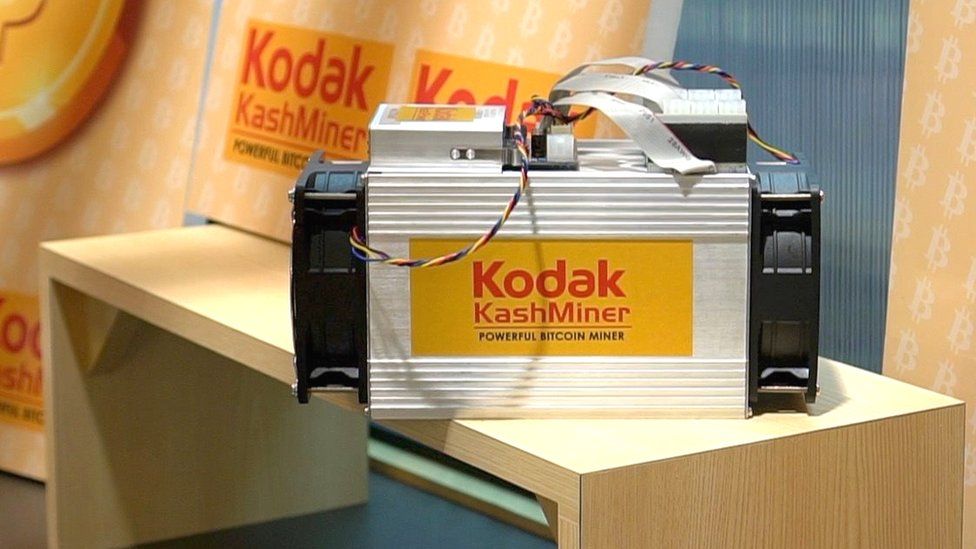Kodak Bitcoin mining scheme evaporates
- Published

The company behind a Kodak-branded crypto-currency mining scheme has confirmed the plan has collapsed.
In January, a Bitcoin mining computer labelled Kodak KashMiner was on display on Kodak's official stand at the CES technology show in Las Vegas.
But critics said the advertised profits were unachievable and misleading.
Now the company behind the scheme says it will not go ahead. Kodak told the BBC it was never officially licensed.
Halston Mikail, chief executive of Spotlite USA, which licenses the Kodak brand for various products, rejected the critics' description of the scheme as a "scam".
As to the decision not to proceed with the scheme, Mr Mikail said that this was driven by the fact that the "price of Bitcoin has dropped therefore offering hashpower as an investment opportunity is not a viable business opportunity".
What was the plan?
Spotlite USA is one of many companies that licenses the Kodak brand to put on its own products.
It showed off a Bitcoin-mining computer labelled Kodak KashMiner in January and told the BBC that it planned to let people rent the machines.
To mine crypto-currency, computers are tasked with solving complicated mathematical problems in order to verify crypto-currency transactions. Successful miners are rewarded with bitcoins for their efforts.
Spotlite planned to let people pay an up-front fee of around $3,400 (£2,500) to rent a KashMiner, and would let customers keep a cut of any bitcoins generated.
Mr Mikail detailed plans to install hundreds of the devices at the Kodak headquarters in Rochester, New York, to take advantage of cheap electricity offered by an on-site power plant.
He said 80 devices were already in operation.
But Kodak told the BBC that no devices had been installed.
'Unrealistic' plans
In its promotional material, Spotlite said an up-front investment of $3,400 would generate earnings of $375 a month for two years by mining Bitcoin.
However, critics said the promised profits did not take into account that mining Bitcoin is becoming increasingly difficult.
Writer and sceptic David Gerard called it a "crypto-currency folly", suggesting the scheme never went beyond its unfinished website.
"There is no way your magical Kodak miner will make the same $375 every month," wrote economist Saifedean Ammous, who pointed out that anybody taking the gamble would have made a loss on their investment.
In a phone call with the BBC, Mr Mikail said the company would instead run its mining operation privately with equipment installed in Iceland, instead of renting capacity to consumers.
A spokesman for Kodak told the BBC: "While you saw units at CES from our licensee Spotlite, the KashMiner is not a Kodak brand licensed product. Units were not installed at our headquarters."
Mr Mikail disputes the first part of this statement saying that at a minimum he had the right to sell KashMiner-branded hardware.
- Published9 January 2018
- Published1 February 2018